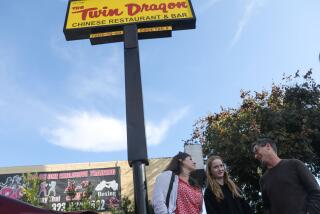Turkey Given Bird by New World Immigrants
- Share via
NEW YORK — The pilgrims would have cried fowl, but turkey is not the top bird for many immigrants who celebrate Thanksgiving here.
“I hate turkey, it’s too dry,” said Frehiwot Kedbe, 32, who will cook Ethiopian dishes for her family. On the menu will be baked chicken, spicy lentils and spinach sopped up with a crepe-like, spongy injera bread.
“It’s a family day for us,” said Kedbe, who adopted the holiday “because we live here.”
Kedbe is not alone. Nearly one-third of New York’s 7 million residents are foreign-born, according to the New York Department of City Planning. An informal survey found that many celebrate Thanksgiving primarily as a family day, combining familiar dishes with American tradition.
Roast turkey will be served alongside curried goat stew and steamed red snapper at the home of Gary Hinds, 26, a Jamaican who has lived in Brooklyn for 10 years.
Hinds doesn’t like turkey, but his mother cooks it for the younger kids, “the American ones,” he said, “who don’t remember Jamaica. They hear about Thanksgiving in school.”
There’s even a name for what happens when national eating traditions converge, said Sharon Olson, a Chicago-based consultant specializing in food trends.
“We call it fusion cuisine--fusing nationalities and types of cooking,” Olson said.
But Ghislane Jean-Simon, 32, who’s been here for a decade, doesn’t call it that. She’s just trying to please her family’s changing tastes when she cooks a Haitian-style turkey .
Jean-Simon prepares a stuffing of cooked ham ground with lemon, garlic, vinegar and tomato paste for the turkey. Fried bananas and a thick brick of sweet potato pudding will also be on the menu.
Unlike grocers across America, Eddy Wolf, the manager of Best Meats in Brooklyn, doesn’t offer turkeys below cost to lure customers.
Wolf will do 25% more business in the days leading up to Thanksgiving. However, turkeys won’t be flying out the door.
“We don’t sell any more turkeys than usual,” Wolf said.
Shoppers from his heavily immigrant neighborhood of Flatbush will feast instead on oxtail, goat meat, chicken and fish.
The turkey industry doesn’t make much effort to convert new Americans to the bird, according to Stewart Proctor of the National Turkey Federation.
“There’s no need to promote turkeys at Thanksgiving, because everybody’s doing it,” Proctor said, noting that turkey sales have doubled in the last decade. Annual consumption now averages 18.3 pounds per person.
“We did translate turkey cooking instructions into Spanish last year,” said Proctor who added that the response was “not great.”
Gloria Glas, an Argentine immigrant, bakes turkey, mashed potatoes, stuffing and pumpkin pie, as “an American joke,” but refuses to watch football afterward.
“That’s where I draw the line,” Glas said.
For the newest New Yorkers, the holiday known as “turkey day” is a time to enjoy family and friends.
“Nobody thinks about the story of the pilgrims. It’s only for the family coming together,” said Victor Calero, 32, whose Argentine father used to cook potato pie, veal Parmesan, and “lots of salad,” for the annual feast.
“It’s a chance to have a reunion,” said Steven Lee, 62, a retired immigrant from Hong Kong who eats noodles with peanut sauce alongside his turkey.
Unlike many Americans, Brenda Casaravilla’s Uruguayan family won’t eat in the midafternoon.
Instead, Casaravilla’s dinner of roast pork, sweet potatoes, and guava gelatin is served after everyone gets off work in the evening.
“Everybody works on this day,” said Casaravilla, 28, who runs a cashier in a bakery.
Some of the city’s newest immigrants feel they have nothing to celebrate because their families are far away.
“Our parents are in Europe. They are not here, so we have no reason,” said Nikola Buladovic, 41, who arrived from Yugoslavia five months ago.
For others, the introduction to an annual American tradition is just beginning.
“When I came over 10 days ago, I heard about it on the airplane. For now I am happy just to be here,” said Yugoslav Vladan Bratovic.
More to Read
Sign up for Essential California
The most important California stories and recommendations in your inbox every morning.
You may occasionally receive promotional content from the Los Angeles Times.













